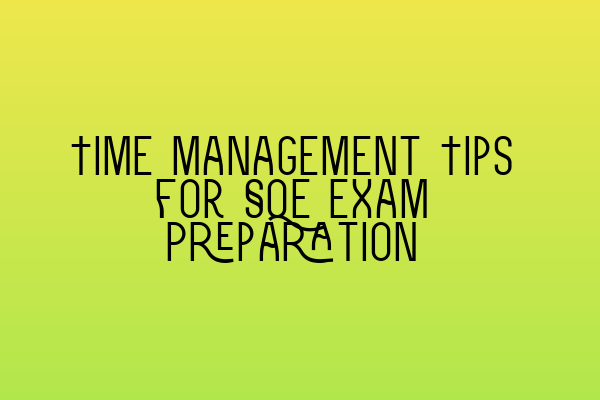Time Management Tips for SQE Exam Preparation
Preparing for the SQE exam can be a daunting task. With the vast amount of material to cover and the limited time available, effective time management is essential for success. In this article, we will provide you with valuable tips on how to manage your time efficiently during SQE exam preparation.
1. Create a Study Schedule
A study schedule is a crucial tool that will help you prioritize your study sessions and allocate time to each subject. Start by identifying your peak study hours, when you are most alert and focused. Then, divide your study sessions into manageable blocks of time and assign specific topics or subjects to each session. Remember to include short breaks to avoid mental fatigue.
For example, you could schedule a two-hour study session in the morning, followed by a 15-minute break, and another two-hour session in the afternoon. By following a schedule, you will have a clear plan of action and be more likely to stay on track.
2. Set Achievable Goals
When preparing for the SQE exam, it’s important to set realistic and achievable goals. Break down your study material into smaller, measurable objectives. For instance, instead of aiming to learn an entire chapter in one session, set a goal to understand and summarize specific subtopics.
By setting achievable goals, you’ll experience a sense of accomplishment and maintain motivation throughout your preparations. Celebrate each milestone you achieve, whether it’s completing a topic or mastering a specific skill. This positive reinforcement will keep you engaged and encourage progress.
3. Prioritize your Study Material
The SQE exam covers a wide range of topics, and it’s essential to prioritize your study material based on its weightage and your strengths and weaknesses. Start by analyzing the exam syllabus and identifying the subjects or areas that carry more marks or require extra attention.
Your study schedule should reflect this prioritization, allocating more time to the subjects that need greater focus. However, do not neglect the other subjects entirely as they also contribute to your overall score. Strive for a balanced approach.
4. Utilize Active Learning Techniques
Active learning techniques involve engaging with the study material actively, rather than passively reading or listening. By actively participating in your learning process, you can enhance understanding, retention, and application of knowledge.
Some effective active learning techniques for SQE exam preparation include:
- Note-taking: Write down key concepts, summaries, and important details while studying. This will help reinforce your understanding and serve as a useful reference when reviewing.
- Flashcards: Create flashcards with questions or key terms on one side and answers or definitions on the other. Use them for self-testing and quick review sessions.
- Practice Questions: Solve practice questions and past exam papers to familiarize yourself with the exam format, timing, and types of questions. This will also help you identify areas where further work is needed.
5. Minimize Distractions
When studying for the SQE exam, it is essential to eliminate or minimize distractions to maximize your productivity. Find a quiet, well-lit study space where you can focus without interruption. Turn off notifications on your phone or place it in another room to reduce the temptation to check messages or social media.
If you find it difficult to concentrate for extended periods, consider using the Pomodoro Technique. This time management method involves studying in focused 25-minute intervals, followed by a short break. After several cycles, take a longer break to recharge.
Remember, effective time management requires discipline and self-control. Stay committed to your study schedule and make conscious efforts to stay on task.
Conclusion
Preparing for the SQE exam requires efficient time management to cover the extensive syllabus effectively. By creating a study schedule, setting achievable goals, prioritizing your study material, utilizing active learning techniques, and minimizing distractions, you can optimize your exam preparation and increase your chances of success.
For more valuable insights and tips on exam preparation, check out the following related articles:
- Expert Insights: Solicitors in UK Courts – Tips and Strategies for Success
- SQE Exam Study Group: Collaborative Learning for Exam Preparation
- SQE Exam Prep Resources: Tools for Effective Exam Preparation
- Comparative Analysis: Delaware LLCs vs UK Companies
- The Ultimate Guide to SQE Exam: Everything You Need to Know

Leave a Reply